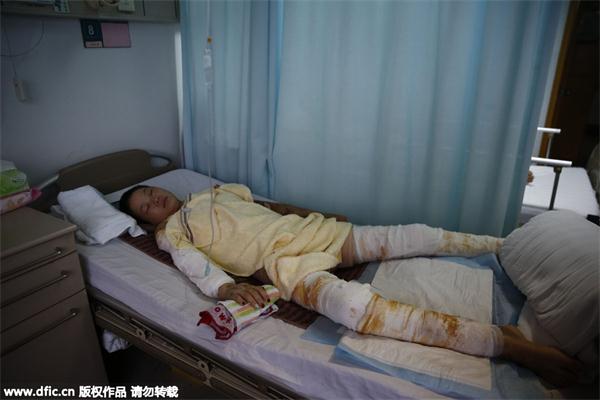 |
|
Li Juan lies in her bed at the General Hospital of Nanjing Military Region. [Photo/IC] |
An ongoing fraud investigation involving cash donations of more than 800,000 yuan (about $126,000) fomented by two Anhui province natives who allegedly cheated donors sympathetic to a “good” Samaritan allegedly mauled by dogs while saving a child is drawing much attention here in Anhui and in the country at large. Serious lessons should be drawn from it.
The situation started on Oct 13 when Bozhou Evening News reported that Li Juan, a 27-year-old woman in Lixin county, which is under the jurisdiction of Bozhou city, was seriously wounded by two dogs while saving a 10-year-old girl at around 9 pm on Sept 1. The report quoted Li’s husband, Zhang Hongyu, as saying that when Li drove away the dogs chasing the child, the animals turned around and began to maul her until she fainted on the roadside. Li was found by Zhang’s friend, Yan Qingliang, and was sent by ambulance to the local hospital for treatment.
Zhang went on to note that as his wife is being treated at the General Hospital of Nanjing Military Region. More than 400,000 yuan have been spent on three rounds of surgery and she awaits three more rounds.
On Oct 14, local media in Anhui and some other media in Nanjing and elsewhere also reported the story and all quoted Li’s husband, Zhang. The Nanjing-based Modern Express also quoted Li’s mother, Kang Shiying, who said she wasn’t clear about the details of what happened to her daughter. The media reports, coupled with online and social media dissemination, touched many people, who began to make donations to Li for being such a “good” Samaritan. By the night of Oct 19, the family had received more than 700,000 yuan.
People were completely shocked on Oct 20 when Hefei-based Market Star, quoting police in Lixin county, reported that Li never saved the child. On the same day, a whistleblower named Conan disclosed that Zhang fabricated the event and encouraged him to help start the fabrication. Zhang told him that Li didn’t save a child and Conan declined to get involved.
On Oct 21, Zhang admitted he lied and fabricated the story in a bid to woo donors to give money to save his "wife". Zhang has two children from his first marriage and has been in love with Li for several years, but they have not applied for a marriage certificate. Li was mauled by two dogs he raised. His friend, Yan, also admitted he lied.
Donors became furious at the deception. Some called for reimbursement of the donated cash, which some lawyers say is permissible. Zhang went back to Anhui for questioning by police.
An online sample analysis revealed that around 36 percent said they were cheated, while 30 percent condemned the media for a lack of professionalism by only quoting Zhang and not checking facts with other sources. Seventeen percent said the cheaters should bear legal responsibility. Ten percent said they should somehow help the person in need despite being cheated.
This reminded me of one thing: take care to avoid cyber and social media fraud! From this incident, the need to do so is clear. After stories were printed in newspapers, they appeared on websites and social media, becoming widespread and drawing the attention - and the compassion - of many viewers. The Anhui Business Daily stated clearly on Oct 22 that it is exactly the large number of easy followers that helped the cheaters succeed. Thus it is necessary to try to prevent such fraud.
But, how does one stop cyber and social media fraud? First of all, there should not be cheaters at all. If the cheaters did not bring in any fabrications, there would not be any fraud. Second, the media (newspapers, TV and radio stations, cyber and social media) must be serious in its reporting.
There should be multiple sources and double checks in the stories, with the names --- or even professions - of those interviewed. The media should not be misled by liars - as it did in this instance. If the media closes the door on cheaters, they won’t be able to enjoy a scam as easily as they did with this one. And third, readers and viewers should be vigilant.
For something like this incident, you should ask yourself several questions: Are the one-sided quotes from Zhang and his friend believable? Where is the 10-year-old girl and her family? How can Li Juan spend 400,000 yuan from three rounds of surgery? If she is an employed worker – as Zhang claimed she was “riding back from work” - her employer can shoulder most of the cost from work-related injuries. Even if she is unemployed, the country’s New Rural Cooperative Medical program or comprehensive arrangement for serious disease might help. From these, you can make your own judgment and will possibly not be quite misled.
The Chinese people have an old saying, “l(fā)ook before you leap”, which means you should be prudent in many things. From this event you should learn to ask questions and learn to avoid fraud, especially cyber and social media fraud, which is so rampant nowadays.